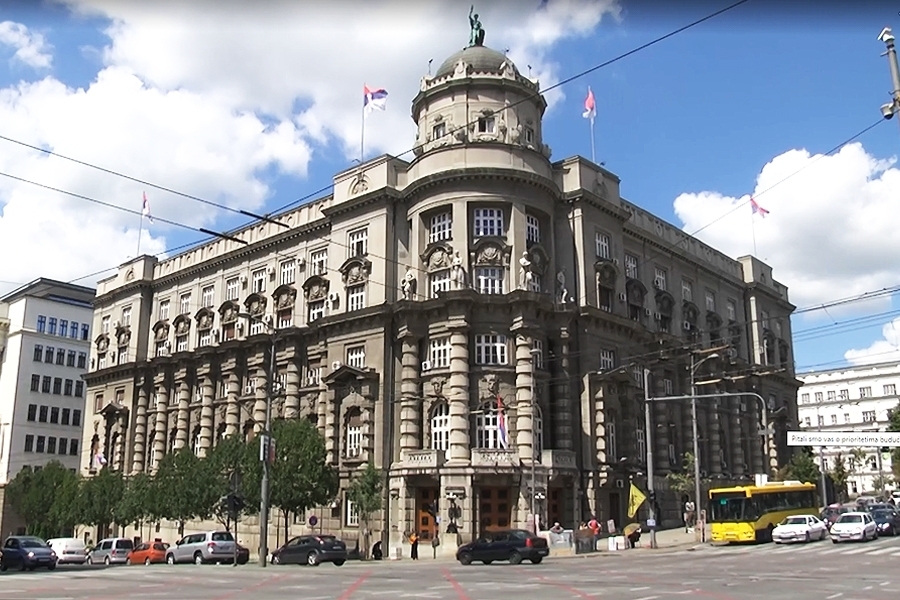In Serbia, a total of 9,568 companies with majority capital from the European Union operate, employing 281,841 workers, or 20.4 percent of the total number of employees in the country. In other words, every fifth employee in Serbia works for a company with majority capital from the European Union.
The claims about the necessity of changing Serbias economic course are unfounded, as evidenced by the fact that from 2001 to 2023, companies from the European Union have invested 20.3 billion euros in Serbia, accounting for as much as 50 percent of total foreign investments, which is far more than Chinese (3.1 billion euros) and Russian (2.5 billion euros) investments.
A total of 17,700 companies in Serbia, regardless of the origin of capital, export a portion of their products to EU countries, employing around 675,000 workers.

In Serbia, a total of 9,568 companies with majority capital from the European Union operate, employing 281,841 workers, or 20.4 percent of the total number of employees in the country. In other words, every fifth employee in Serbia works for a company with majority capital from the European Union.
The claims about the necessity of changing Serbias economic course are unfounded, as evidenced by the fact that from 2001 to 2023, companies from the European Union have invested 20.3 billion euros in Serbia, accounting for as much as 50 percent of total foreign investments, which is far more than Chinese (3.1 billion euros) and Russian (2.5 billion euros) investments.
A total of 17,700 companies in Serbia, regardless of the origin of capital, export a portion of their products to EU countries, employing around 675,000 workers.

Although certain geopolitical circles are increasingly vocal that instead of economic cooperation with European Union countries, Serbia should reorient towards strengthening economic relations with countries like China and Russia, statistics relentlessly show not only that this is an "impossible mission," but without the presence of investments and donations from the EU, the state budget that Belgrade has at its disposal could not be adequately filled.
In other words, ceasing cooperation with Brussels would represent a real catastrophe for the Serbian economy, the expert public warns. Also, the state treasury would be left without significant funds, which, as figures show, would crucially affect its replenishment. Simply put, without the money that flows into the budget directly or indirectly thanks to the European Union, the sustainable disbursement of pensions and salaries in the public sector would be a big question.
Proponents of changing Serbias economic course who advocate for establishing close cooperation with Russia and China, among other things, argue in favor of this by citing Beijings desire to invest in our country, seeing it as an opportunity to intensify economic relations with it and other BRICS members.
Looking at the data on foreign company investments in Serbia in the first ten months of last year, it is clear that China was the single largest investor with 592.6 million euros. Considering the obvious fact that China is increasing its investments in Serbia, one might conclude that those advocating for a change in Belgrades economic course are absolutely right. However, this data is misleading, and a broader view reveals something entirely opposite: the largest investor in Serbia last year was actually the European Union. If we examine the total share of investments in our country in 2023, we find that those from the European Union are represented at 65.8 percent, while those from China are reduced to 32.3 percent. Further, by looking at the list of the six largest country investors in Serbia last year, it can be determined that four of them are EU members, with two occupying the top three spots.
The argument against the necessity of changing Serbias economic course is also supported by the fact that from 2001 to 2023, companies from the European Union have invested 20.3 billion euros in Serbia, accounting for as much as 50 percent of total foreign investments, which is far more than Chinese (3.1 billion euros) and Russian (2.5 billion euros) investments.
Its important to emphasize that the European Union is also Serbias largest trading partner, accounting for about 60 percent of its trade.
The most goods from our country in the first ten months of last year were exported to Germany (3.6 billion euros), followed by Bosnia and Herzegovina (1.6 billion euros), Italy (1.5 billion euros), Hungary (1.4 billion euros), and Romania (1.2 billion euros). Thus, out of the top five countries on this list, four are from the European Union.
Regarding imports to Serbia, Germany ranks first again (4 billion euros), followed by China (3.7 billion euros), Italy (2.2 billion euros), Turkey (1.4 billion euros), and Russia (1.39 billion euros). On this list, EU countries occupy the first and third places.
In Serbia, a total of 9,568 companies with majority capital from the European Union operate, employing 281,841 workers, or 20.4 percent of the total number of employees in the country. In other words, every fifth employee in Serbia works for a company with majority capital from the European Union.
Looking at companies, regardless of the origin of capital, that export more than 50 percent of their products to the EU market, its found that they employ about 370,000 people in Serbia.
A total of 17,700 firms in Serbia, regardless of capital origin, export a portion of their products to EU countries, employing about 675,000 workers.
If the number of employees in these companies were to decrease by just 10 percent, the states monthly income difference, in terms of taxes and contributions, would be 17 billion dinars per month. These funds typically provide for the salaries of about 16,000 employees in education or about 14,000 workers in healthcare.
According to a survey by the Chamber of Commerce of Serbia, which involved about 1,000 companies, as many as 80 percent of them believe that any disruption would hamper their business with the EU in their dealings with the European Union. For 35 percent of these companies, the EU represents a significant import market, while 50 percent have substantial imports from the EU market necessary for their operations.
Moreover, the European Union is the largest donor in Serbia. Since 2001, through various instruments and funds, the EU has provided more than three billion euros in grant aid to Serbia to support reforms. Support from EU funds is aimed at necessary legal, institutional, administrative, economic, and social reforms on the path to the EU in various areas, from justice, public administration, and public finances to education, employment, transport, agriculture, and environmental protection. The support also contributes to the development of local economies, reducing disparities in the development of different areas, providing opportunities for employment and education, and addressing critical challenges in society.
Dragoljub Raji?, the coordinator of the Business Support Network, emphasizes that there absolutely is no alternative to economic cooperation that Serbia could find if it were to break away from the European Union countries.
"The Serbian economy is entirely dependent on the European Union market, which is, by all accounts, its biggest partner. Also, it should be considered that even the example of Chinese investments in Serbia would not exist if the situation were different. In other words, Chinese companies are present here, besides being able to use our resources at a low cost, primarily because it gives them the opportunity to place their products on the EU market, using the agreements Belgrade has signed with Brussels regarding trade. Otherwise, Beijing would not be interested in investing in Serbia," Raji? states.
He adds that at this moment, Serbia is utilizing various EU funds for its needs, but as a member of the European Union, the funds from the common pots would be significantly more accessible and could be received in much larger amounts, which would significantly reflect on the economic development of our country.
In all societies there are issues that are rather being skipped. Certain...
The neoliberal path, started in 2001, has led to especially bad results in Serbi...
For centuries, the region was subsumed within the Ottoman and Hungarian Empires,...
"Serbia has returned to the systemic and anti-systemic position of the political...
In reality, Serbia is closer than ever to NATO. In the course of the last five y...